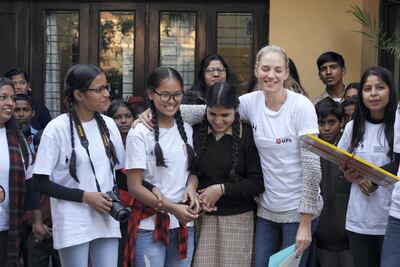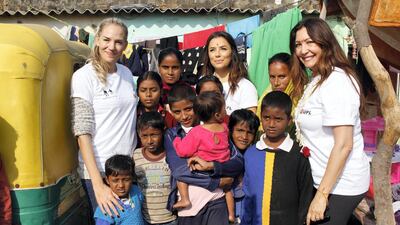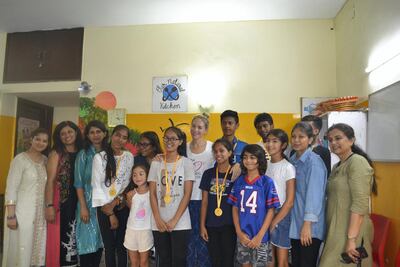A day shelter for Indian street children run by Dubai-based expatriates has received enough money from the 100 Million Meals campaign to feed hundreds of families for six months.
The pandemic pushed Harmony House in Guragon, just southwest of New Delhi, to the brink forcing it to change its work overnight.
In March last year, the centre went from providing day care and education for hundreds of kids to shouldering the responsibility of feeding their whole families as Covid-19 robbed them of the chance to work.
“We literally had to shift our focus and become food distributors for our communities,” said Lucy Bruce, who runs Harmony House with her Indian husband, Gaurav Sinha.
“That was an enormous expense for us to be able to feed up to 5,000 plus people on a daily basis.
“The financial burden it has had, purchasing the dry rations that we need to every single day has taken its toll on us.
“The costs are very high. But we are very fortunate that people could see the devastation and the impact it had, and we were able to access funding.”

The shelter has now been informed it will be receiving Dh1m to pay for 1 million meals for its families.
“Once we have received the funding we will be providing meals for 500 families for six months, with three meals a day," said Ms Bruce.
“I think that equates to 999,900. We fall short of 1m meals by about 100 meals. But we will reach that number,” she said.
"We are extremely grateful to the 100 Million Meals campaign."
The charity, which is registered in both the UK and India, was founded more than a decade ago, when it transformed two villas into full-time community centres for more than 550 women and children from a nearby slum.
There they are offered education, nutrition, medical treatment, vocational training and social services.
It has made a huge difference to many families’ lives, which have suffered from additional hardships since the onset of the pandemic. Not just because they have had the virus as very few have developed symptoms.
“This particularly community, and there are millions of people in India like this, have extremely high immunity because of the way they live. So these viruses are not necessarily affecting them in the way it would affect people who are living in middle class homes,” she said.
“But no one has the opportunity to work anymore. So they are not able to feed their families,” she said.
“They are not able to necessarily provide the shelter they were before because they are losing their homes, which were very humble slum dwellings.
"Although they did pay rent for these very simple rooms, where up to nine or 10 members of a family would live.”
India’s coronavirus case numbers climbed sharply again on Friday, prompting the army to open up its hospitals in a desperate bid to relieve the humanitarian crisis created by an acute shortage of beds, medicines and oxygen.
With 386,452 new cases and 3,498 deaths in the previous 24 hours, India is currently posting a world record infection rate of more than 370,000 cases and 3,600 deaths a day.
The Mohammed bin Rashid Al Maktoum Global Initiatives (MBRGI), organiser of the 100 Million Meals campaign, has joined international and local partners in each of the beneficiary countries.
MBRGI and the UN World Food Programme will also distribute cash vouchers to the needy in Palestine and refugee camps in Jordan and Bangladesh.
The vouchers can be used at local food banks.
The UAE officially reached its Dh100 million target for the 100 Million Meals campaign in just 10 days.
A website allowed the public to donate as little as Dh10 to fund 10 meals, rising to Dh500 or more.
The total was reached thanks to the generosity of 185,000 donors inside and outside of the Emirates.













